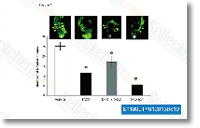A suppression of protein synthesis was advised to possibly be far more significant after hind limb suspension whereas greater protein degradation could possibly be extra crucial right after denervation. It is actually interesting to note that the substantial increases observed in phosphorylated 4EBP1, p70S6K1 and a replacement rpS6 are comparable in atrophic and hypertrophic denervated muscular tissues whereas substantial increases in complete proteins were only observed for p70S6K1 and rpS6 in denervated hypertrophic muscle. Because the actual roles of p70S6K1 and rpS6 from the regulation of protein synthesis are not fully clear it’s not evident how these differences ought to be interpreted. Furthermore, modifications from the phosphorylation standing of signaling molecules such as p70S6K1 and 4EBP1 may not usually imply alterations in protein synthesis.
However, the present order PCI-32765 outcomes may perhaps well be in line with earlier research indicating elevated protein synthesis in hypertrophic hemidiaphragm muscle likewise as in atrophic hind limb muscular tissues of grownup mice denervated for very similar time intervals as while in the existing review. Elevated phos phorylation of p70S6K1 in extensor digitorum longus muscle groups denervated for seven days and in gastrocnemius and soleus muscles denervated for two weeks has also been reported previously. Greater protein synthesis in denervated skeletal muscle may perhaps, no less than in component, be relevant to denervation modifications apart from people triggering alterations in muscle mass. Following denervation a number of proteins are differentially expressed in denervated in contrast to inner vated muscle groups.
Thus,  the expression of myosin isoforms modifications following denervation and acetylcholine receptors are expressed in extrasynaptic parts of your sarcolemma. Quite a few properties of denervated muscle, this kind of as the elevated expression of acetylcholine receptors, expression on the embryonic acetylcholine receptor gamma subunit, expression of tetrodotoxin resistant sodium channels and increased expression of myogenic variables, such as myogenin and MyoD, resemble properties of building muscular tissues. Myogenin was lately advised to manage denervation dependent skeletal muscle atrophy and MyoD has become proposed to participate in a positive suggestions regulation with Akt2 in muscle differen tiation, a procedure by which Akt one has also been impli cated. Improved expression of ribosomes and anabolic variables this kind of as Akt and rpS6 may hence be connected to enhanced synthesis of specific proteins expected for your tissue remodelling that happens following denervation. Taken with each other, the outcomes of your current research and those of a number of prior scientific studies indicate that skeletal muscle atrophy following denervation is additional more likely to de pend on improved protein degradation than on an overall lessen in protein synthesis.
the expression of myosin isoforms modifications following denervation and acetylcholine receptors are expressed in extrasynaptic parts of your sarcolemma. Quite a few properties of denervated muscle, this kind of as the elevated expression of acetylcholine receptors, expression on the embryonic acetylcholine receptor gamma subunit, expression of tetrodotoxin resistant sodium channels and increased expression of myogenic variables, such as myogenin and MyoD, resemble properties of building muscular tissues. Myogenin was lately advised to manage denervation dependent skeletal muscle atrophy and MyoD has become proposed to participate in a positive suggestions regulation with Akt2 in muscle differen tiation, a procedure by which Akt one has also been impli cated. Improved expression of ribosomes and anabolic variables this kind of as Akt and rpS6 may hence be connected to enhanced synthesis of specific proteins expected for your tissue remodelling that happens following denervation. Taken with each other, the outcomes of your current research and those of a number of prior scientific studies indicate that skeletal muscle atrophy following denervation is additional more likely to de pend on improved protein degradation than on an overall lessen in protein synthesis.
Natural Product
A natural product is a chemical compound or substance produced
